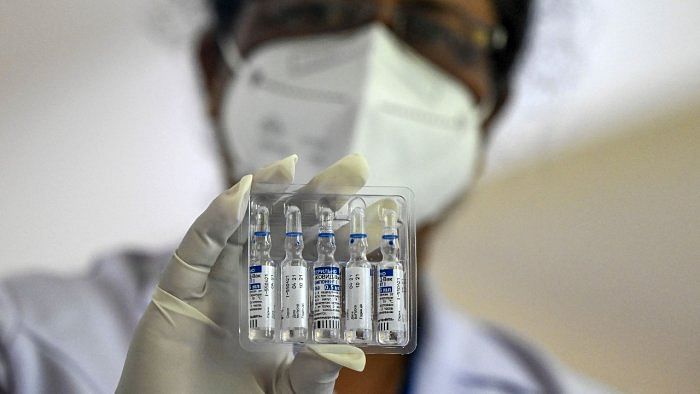
France joined the United States on Thursday in supporting an easing of patent and other protections on Covid-19 vaccines that could help poorer countries get more doses and speed the end of the pandemic. While the backing from two countries with major drugmakers is important, many obstacles remain.
The move to support waiving intellectual property protections on vaccines under World Trade Organisation rules marked a dramatic shift for the United States — and drew cheers from activists, complaints from Big Pharma, and a lot of questions about what comes next. Washington had previously lined up with many other developed nations opposed to the idea floated by India and South Africa in October.
Attention is now turning to those richer nations, notably in the European Union — and France was the first to voice its support.
"I completely favour this opening up of the intellectual property,” French President Emmanuel Macron said Thursday on a visit to a vaccine centre.
But he also expressed doubt — as the pharmaceutical companies have — that the measure would be the panacea some hope. Even if patents are waived, he said, drug makers in places like Africa currently are not equipped to make Covid-19 vaccines — so donations of doses should be prioritized instead.
Another key hurdle remains: Any single country could block a decision at the WTO, a Geneva-based trade body of 164 member states, to agree to a waiver.
The EU Commission president, Ursula von der Leyen, said the 27-nation bloc was ready to talk about the US proposal — but cagily remained noncommittal for now.
"We are ready to discuss how the US proposal for waiver on intellectual property protection for Covid vaccines could help” end the crisis, she said in a video address. “In the short run, however, we call upon all vaccine producing countries to allow exports and to avoid measures that disrupt supply chains."
That echoed the position of the global pharmaceutical industry, which insists a faster solution would be for rich countries that have vaccine stockpiles to start sharing them with poorer ones.
The industry insists that production of coronavirus vaccines is complicated and can't be ramped up by easing intellectual property protections. Instead, it insists that reducing bottlenecks in supply chains and a scarcity of ingredients that go into vaccines are the more pressing issues for now.
"A waiver is the simple but the wrong answer to what is a complex problem,” said the International Federation of Pharmaceutical Manufacturers and Associations. "Waiving patents of Covid-19 vaccines will not increase production nor provide practical solutions needed to battle this global health crisis."
The industry also says an IP waiver will do more harm than good in the long run by reducing the incentives that push innovators to make tremendous leaps, as they did with the vaccines that have been churned out in a blistering, unprecedented speed to help fight Covid-19.
Supporters say a waiver would be important because it would allow manufacturers around the world to get access to the recipes for making the life-saving vaccines as well as the ingredients. They point to unused capacity — factories that could churn out vaccines but can't because of the intellectual property protections.
Some critics say developing countries have been seeking to water down those protections for years - long before the pandemic - and say it's not clear that there are any manufacturers standing by that are ready or able to produce Covid-19 vaccines. They note that the vaccines currently on the market can be incredibly difficult to make, and the know-how is a bigger obstacle to ramping up manufacturing.
Many experts and advocacy groups say any such waiver would need to be followed up by transferring the required technology to developing countries, too.
Intellectual property expert Shyam Balganesh, a professor at Columbia Law School, said a waiver would remove “a lot of the bureaucracy” around WTO rules, but it would only go so far because of other bottlenecks in the manufacturing and distribution of vaccines.
In closed-door WTO talks last month, the EU, Britain and Switzerland said upending or undermining IP rights was a "no-go" because those rights helped contribute to expanding production of Covid-19 vaccines, according to a Geneva trade official, who spoke on condition of anonymity because he was not authorized to discuss the matter publicly.
Norway's Foreign Minister, Ine Eriksen Soereide, last month warned against “this type of experimental trade policy” during the pandemic when “we should rather be concerned with practical solutions that give us more vaccines.”
After the Biden announcement, Eve Geddie, Director of Amnesty International's EU Office, called on Europe now to “put everyone's health and human rights before private profit” and add its support to the waiver idea.
"Today, Europe wakes up to a new political reality that its position on hoarding the rights to make Covid-19 vaccines is now untenable,” she said.
She was but one voice among civil society, progressive groups and international institutions that were euphoric about the Biden administration's stance, which marks a nearly complete reversal in US policy under the Trump administration that was critical of both the WTO and the World Health Organization.